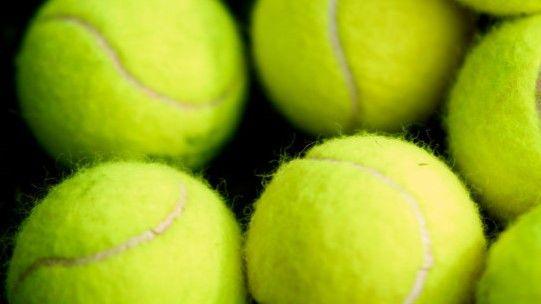Sinner parts with physio & fitness coach after investigation

Jannik Sinner won his first Grand Slam title at the Australian Open in January
- Published
Jannik Sinner says he is no longer working with physiotherapist Giacomo Naldi and fitness trainer Umberto Ferrara following the investigation into his positive tests for a banned substance.
The world number one twice tested positive for clostebol - a steroid that can be used to build muscle mass - in March.
The Italian was cleared of fault or negligence by a tribunal last week, with the International Tennis Integrity Agency (ITIA) finding Sinner had been inadvertently contaminated with the substance by Naldi.
Naldi had been applying an over-the-counter spray - given to him by Ferrara - to a cut on his own hand before then carrying out treatments on Sinner.
"I want to start with [saying] that they have been a huge part for my career," Sinner said in a news conference at the US Open on Friday.
"We made an incredible job, bringing a lot of success and then having a great team behind me.
"Now, because of these mistakes, I'm not feeling that confident to continue with them.
"I was struggling a lot in the last months. Now I was waiting for the result, and now I just need some clean air."
Sinner cleared after testing positive twice for banned substance
- Published20 August 2024
Raducanu faces Kenin in US Open first round
- Published22 August 2024
Sinner 'worn down physically and mentally' by investigation
- Published21 August 2024
Sinner received a warm reception, external from the crowd during his first practice session at Flushing Meadows on Thursday.
Speaking for the first time since the news emerged on Monday, Sinner said it was a "relief" the investigation was over.
Asked if he had concerns about his reputation, Sinner said: "For me, I always believe that I kept playing tennis because in my mind I knew that I haven't done anything wrong.
"Whoever knows me very well knows that I haven't done and I would never do something what goes against the rules.
"Here I also know who is my friend and who is not my friend, because my friends, they know that I would never do that.
"About the reputation, we will see moving forward, no? Because this, I can't really control."
He was given an automatic provisional suspension when he tested positive but was able to keep playing after successfully appealing against it.
Sinner went on to win tournaments in Halle and Cincinnati and become world number one for the first time.
"Of course it's not ideal before a Grand Slam but in my mind I know that I haven't done anything wrong," he said.
"I had to play already months with this in my head.
"I'm just happy that it's finally out because it's one kind of relief also for me and my team, which is still here."
Some players have criticised the decision not to ban Sinner when the positive tests occurred.
Sinner said he went through the same process as any other player, adding: "There is no shortcut, no different treatment.
"I know sometimes the frustration of other players obviously. But maybe because they got suspended is they didn't know exactly where it comes from.
"We knew it straightaway, and we were aware of what happened."
Other players have also expressed surprise at how quickly the process took place, with fewer than five months between the positive test and a verdict.
Two-time Grand Slam champion Simona Halep waited a year for a decision from the initial tribunal after her positive test for a banned substance, and Britain’s Tara Moore more than 18 months.
Britain's Dan Evans - who was given a 12-month ban after testing positive for cocaine in 2017 - said he thought Sinner was "lucky how quickly his case came forward".
“The question marks are how he got through that process so quick, when there’s normally a big backlog to get evidence on both sides," he told BBC Sport.
"I remember with my own case how long it took - nothing was ever done very quick.
"I’m not sure that people are that happy that it’s a fair playing field on the ITIA’s process for all cases.
"We need transparency and fairness.”
The ITIA declined to comment.
Australian Open champion Sinner begins his US Open campaign against American Mackenzie McDonald when the tournament begins on Monday.
Related topics
- Published16 August

